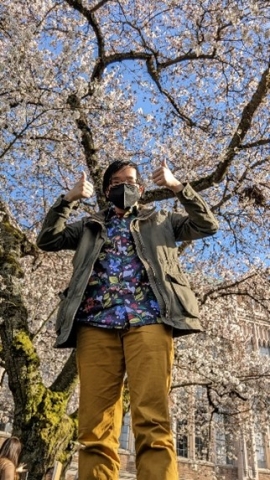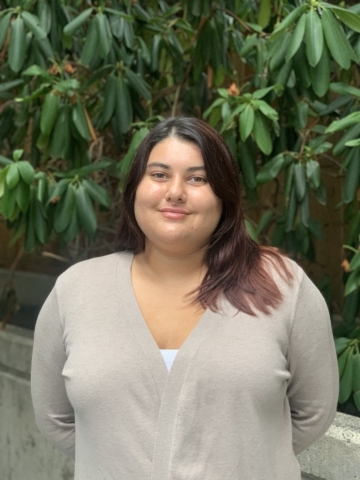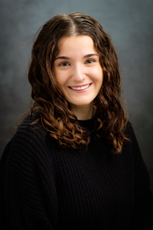Interested in earning a BASW? Check out these BASW student and alumnus profiles to learn about what it's really like to be a BA in Social Welfare major at UW Seattle.
Page Contents:
Breana Graywilliams, BASW Senior

Breana Graywilliams, BASW Senior
Why did you decide to major in Social Welfare? My drive and passion to improve mental wellness in the Black community is what inspired me to take on a major in Social Welfare. I have witnessed and personally experienced the effects of racial trauma and am committed to being a part of the healing of those in my community.
What’s one piece of advice you have for prospective BASW students? Come into this program with an open heart and mind. There will be moments when your beliefs are challenged. The material you go over in class may bring up unhealed parts of yourself that you're forced to confront. Practice vulnerability and make friends with those in your cohort. They can serve as a great support system.
What are your professional goals or anticipated next steps after graduation? After graduation I would like to do an Advanced Standing MSW degree and continue work with either my previous CSL (Community Service Learning) site or practicum site.
What extracurricular activities are you involved in? My extracurricular activities include hiking, skiing, and jewelry making.
Who has made a large impact on you during your time in the BASW program? My experiences with the professors at the school of social work have been very influential to me. Their patience, kindness, and understanding have shown exemplary qualities that a social worker should have. It’s also inspiring hearing about the previous work they've done. This inspires me to grow as a person. The same goes for those I work with at Project Girl (my previous community service learning site where I am now employed).

Jax Wokas, BASW Senior
Why did you decide to major in Social Welfare? I decided to major in Social Welfare because it aligned with my previous experience doing activism work and I wanted to be in a field where I could continue doing that. At the time, I was sharing a lot of space with social workers, so it only felt natural to choose it.
What experiences at UW have been the most influential to you? The community I’ve fostered at UW has been the most influential for me. My community of queer, trans, disabled, neurodivergent Asians and People of the Global Majority. Coming from experiences of much isolation due to my identity, it was so freeing to me to be able to have a community of people who understand my lived experiences and respect me. To find caring like that is something I hope everyone is able to find and is something that I enjoy facilitating in my work.
Who has made a large impact on you during your time in the BASW program? Dr. Kristian Jones had a large impact on my time during the BASW program because he was one of the first professors I had. He made such a stride to make sure students got the most out of the class and was open to making changes to help us succeed. To have such a great welcome to the program reassured me that I had made the correct decision when I chose Social Welfare.
What are your professional goals/next steps after graduation? After graduating, I plan to pursue a Master’s degree in Social Work. After that, I hope to do community-based work on a micro or mezzo level with marginalized populations.
What’s one current issue or topic in social welfare that interests you? What are you passionate about changing? I’m interested in incorporating community knowledge into work and research, particularly in regards to marginalized communities. It’s so common that social workers, particularly white social workers, go into spaces with the idea of “saving” and in turn bring harm to the communities. Therefore, I am interested in changing the way that knowledge is seen, and advocating for the valuing of lived knowledge when it comes to working with marginalized groups.
What extracurricular activities are you involved in? I’m involved in Modality (for QTBIPOC interested in creative work), the Trans Collective, and the Disability Justice Collective, all of which honor parts of my identity while engaging in the intersection of creating spaces of resistance.

Valerie Garibay, BASW Alumnus
Why did you decide to major in Social Welfare? I decided to major in Social Welfare because of the career growth I saw and heard about. You can pursue so many different positions with a social work degree. Even now, there are a lot of different directions I can go with further training, licensure, or education. I also majored in social work because of the tenants and beliefs of social work. They align with my personal beliefs and the way I want to see the world improve.
What’s one piece of advice you have for prospective BASW students? One piece of advise that I would give to prospective students is to be on the lookout for resources and use the resources that the school gives! I applied for a scholarship that was sent out via the school and when the pandemic hit it really helped ease things for me knowing I had support from the school financially. Another key resource is your instructors. I know it can seem daunting and awkward at first, but instructors are great resources and great connections to have. This is something that my class didn’t really get an opportunity for because of the pandemic, and I wish I would have been able to build more of those connections. When job hunting, be open to different opportunities and job options. I ended up going into a sector of social work that I wasn’t in search of, but I appreciate my job and how it has expanded my perspectives. Give things a shot!
What’s one current issue or topic in social work that interests you? What are you passionate about changing? I think a big issue within the field of social work that I have seen is that every organization is given these really rigid and tedious contracts and policies by those who fund us. They are rigid and do not allow flexibility for clients who are experiencing multiple barriers. That is something that I would like to have more opportunity with advocating for change.
What approach did you take to apply for jobs after graduation? The approach I took was to apply for jobs that I could see myself growing with and I kept an open mind. I personally feel that with any social work job, taking chances and being open to different perspectives and diversifying your experience within the field will only aid you as you go on in your career.
What was one big takeaway from the BASW program that you’ve translated into your current role/schooling? One takeaway from the BASW program is to communicate your needs. Most of the time, the instructors were very accommodating with deadlines and taking into account other social issues and how they could be affecting students from those communities. I communicate my need as best I can in my role now, and I think it’s an important thing to learn to avoid burnout.
In what ways did you feel supported during your time at UW as a first-generation student? Who or where did you receive support from? As a first-generation college student, I won’t lie in that I did not feel great support from UW. The options for support are there, but I didn’t seek them out. As a first-generation student I think it can be intimidating going to a big college like UW and not to feel out of place. I didn’t want to be perceived as different than any other student there. As I progress in my career and have amazing mentors, I want other first-generation students to know that you are allowed to ask questions and to not know things, and ultimately it is up to you to take the support offered. You will only be the better for it.

Nora Hull, BASW Senior
Why did you decide to major in Social Welfare? One thing I love about being a Social Welfare major is that there are so many possibilities career-wise within the field. As a student, you are able to explore your options and fine-tune what your passions are. The comprehensive nature of the curriculum and the hands-on learning opportunities that the BASW program offers have made me feel as though I will be prepared to step into a wide variety of settings in the social welfare realm after graduating.
What experiences at UW have been the most influential to you? My time as a Social Welfare student at UW has made an incredible impact on me so far. I am a part of a close-knit community made up of classmates, professors, and advisors in the BASW program. Their insight, support, and wisdom has empowered me to push the limits of my comfort zone and prompted my growth on both on a personal and professional level.
What made you decide to transfer to the UW? To the BASW program? I chose to transfer to UW because I wanted to be a part of a school whose values are aligned with my own. The diversity of the community paired with the school’s emphasis on achieving social justice drew me to the BASW program. Here, I have been able to connect with other students from all walks of life and have found comradery among others like me who are passionate about giving back to the community.
Where was your practicum placement? What did you learn during your time there? I have just begun my practicum placement with Valley Regional Fire Authority in Auburn. It is exciting to have the opportunity to take my knowledge out of the classroom and apply the skills I have learned from my first year. As a student learner in a social work setting, I know I am gaining valuable experience that I can draw from long after my time in the BASW program is over.
In what ways did you feel supported during your time at UW as a first-gen student? Who did you receive support from? It can be overwhelming to begin a two-year program as a first-gen student. UW, and the BASW program in particular, has many resources geared toward navigating the complexities of college life. With support groups, seminars, and one-on-one advising and mentoring, I have been able to ask questions and receive the support I need so that learning can be my number one priority.

Ly Cooley, BASW Senior
What’s one current issue or topic in social work that interests you? What are you passionate about changing? I am passionate about AANHPI mental health equity and representation. There are many factors that prevent AANHPI from accessing quality mental health care such as cultural stigmatization of mental illness, lack of representation in mental health professions, language barrier, and lack of funding in AANHPI mental health care research to name a few. I aim to become a part of the solution by partaking in individual (clinical social work) and systems level (policy, research, and advocacy) change in order to enable a more equitable mental health care system for marginalized individuals.
What extracurricular activities are you involved in? I am currently a member of the Student Advisory Council (SAC) representing the senior cohort. SAC is a collaboration of elected student leaders and SSW faculty and administration who aim to uphold the mission and values of the School of Social Work. Being a member of SAC gives me the opportunity to gain leadership and advocacy skills. I am also the current president of the Organization of Student Social Workers (OSSW). The OSSW is dedicated to enriching the connection between SSW students by hosting social events. The OSSW is also dedicated to providing students with a platform to enact change.
What made you decide to transfer to the UW? To the BASW program? Before attending UW I worked in the tech industry straight out of high school for seven years. Although I enjoyed the rigor of the tech industry, I knew that my passions were elsewhere. I decided to return to Shoreline Community College to complete my AA degree before transferring to the UW’s BASW program. I decided to transfer to the UW since it has the best accredited BASW program in Washington State. The field opportunities in the BASW program are second to none in Washington and the professors are all highly skilled and passionate about social change. I also appreciate the emphasis that the UW’s BASW program places on social justice.
What advice do you have for prospective transfer students? My first piece of advice for prospective students is to attend the available BASW info sessions. The info sessions are a helpful place to learn about the application requirements and ask any questions. The second piece of advice for prospective students is to make sure that you meet with both your community college advisor and the BASW advisor, Nicole Guenther. The community college advisor can help make sure that you are on track to transfer and that all of your classes will transfer over. Nicole will be able to help answer the BASW program specific questions.
In what ways did you feel supported during your time at UW as a first-gen student? Who did you receive support from? Nicole Guenther, our BASW advisor, was a huge support to my adjustment to life at the UW as a first-generation student. I felt confident that I could reach out to her whenever I needed support or guidance. Additionally, many of my cohort are also first-gen students and we collectively support each other throughout the program.
What advice do you have for incoming first-generation students? My advice to first-generation students is to try not to assume that you are alone in whatever you are facing whether it is emotionally or academically. Often times, at least one of your peers will experience the same thing or something similar. Additionally, many people in helping professions such as social work experience imposter syndrome. It is okay to feel this way but just know that you are not expected to be an expert immediately. You will gain skills and knowledge throughout the program that will help you to build your competence and your confidence. Lean on your cohort and remember that you are here because you deserve it.